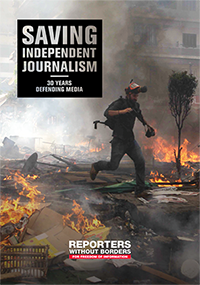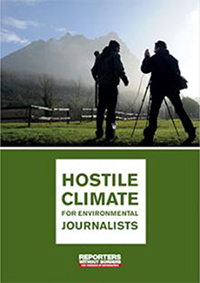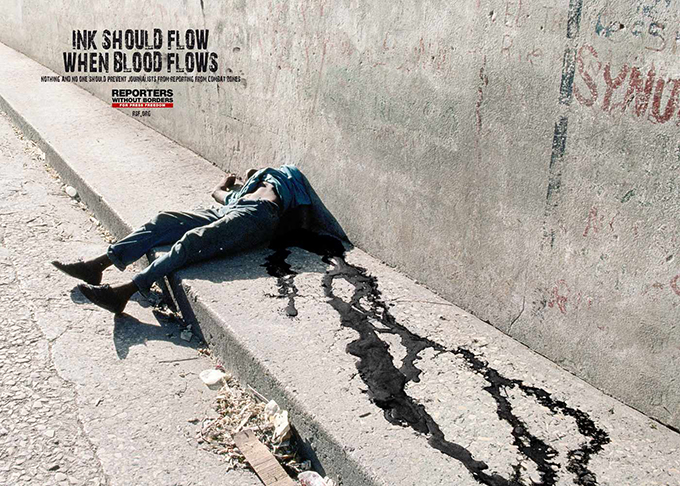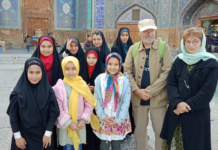From Pacific Journalism Review
Reviewed by David Robie
Saving Independent Journalism: 30 Years Defending Media (39pp); Hostile Climate of Environmental Journalists (27pp). 2015. Paris, France: Reporters Without Borders.
 THIRTY years ago, Reporters Without Borders (RSF) began its global campaign for the protection of journalists and against propaganda as a fledgling NGO in the southern French city of Montpellier. As it declares in the editorial of this publication marking the event, RSF has been “cheekily climbing the barricades, boldly waving freedom’s banner, proclaiming the virtues of journalism, supporting heroes, dispensing safety equipment, funding resistance and applying pressure in the palaces where the laws are written” (p. 3).
THIRTY years ago, Reporters Without Borders (RSF) began its global campaign for the protection of journalists and against propaganda as a fledgling NGO in the southern French city of Montpellier. As it declares in the editorial of this publication marking the event, RSF has been “cheekily climbing the barricades, boldly waving freedom’s banner, proclaiming the virtues of journalism, supporting heroes, dispensing safety equipment, funding resistance and applying pressure in the palaces where the laws are written” (p. 3).
Three decades on and the now Paris-based agency has matured into a “big little NGO”. It has consultative status with the United Nations, UNESCO, Council of Europe and the Independent Organisation of La Francophonie. Saving Independent Journalism recounts RSF’s growth and many high points of its media freedom campaigns.
The agency communicates in English, French, Spanish, Arabic and Farsi daily and frequently uses Russian and Chinese as well.
It has correspondents in 130 countries – including Australia, NZ and five Pacific countries, eight autonomous national sections and bureau in 12 cities around the world. Two more in the pipeline for Hong Kong and Sao Paulo.
The agency has made many submissions and interventions over press freedom in the South Pacific, notably over Fiji during eight years of military dictatorship from 2006-2014.
Among countless media people RSF has defended are Hla Hla Win, a young woman Burmese journalist sentenced to 27 years in prison for interviewing Buddhist monks during the 2007 “Safron Revolution”; Mexican publisher Jesús Lemus Barajas of El Tiempo newspaper who disappeared while investigating a drug cartel (he was found in jail on trumped up charges and three of his lawyers were murdered); Saudi blogger Raïf Badawi who was sentenced to 10 years in prison and 1000 lashes over a charge of apostasy; and award-winning Chinese journalist Gao Yu who has been imprisoned since 2014 for sending a copy of an internal Community Party memo to a foreign news organisation.
RSF secretary general Christophe Deloire argues: “Whether totalitarian … violent or soft, information control is taking unprecedented forms that free citizens must oppose with all their strength.” He also offers a strong message for supporters.
 The second RSF title reviewed here is very timely, coinciding with the COP21 climate summit in Paris. Hostile Climate for Environmental Journalists has investigated threats to freedom of information about the environment rather than risks to the environment itself:
The second RSF title reviewed here is very timely, coinciding with the COP21 climate summit in Paris. Hostile Climate for Environmental Journalists has investigated threats to freedom of information about the environment rather than risks to the environment itself:
“The [3000] journalists accredited to COP21 [were] in no danger (except the danger of pressure from lobbyists) but the same cannot be said of many of their colleagues, who are often exposed to terrible dangers.”
The report shows that at least 10 journalists covering environmental issues were murdered between 2010 (the last RSF report) and 2015 – three-fifths of them in the Asia-Pacific region: Cambodia (2), India (2), Indonesia (2), Philippines (2) and Russia (2).
As well as documenting the murder with impunity cases, the report highlights the case of eight “green journalists in red zones” in Algeria, India, Italy, Liberia, Maldives, Russia and Vietnam.
RSF cites gagging by countries such as China, Ecuador and Canada, and notes that many environmental journalists are forming associations with the aim of improving the quality of their stories and protecting their members in the field.












































